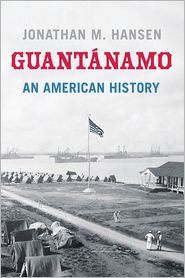
He applied the “Page 99 Test” to his new book, Guantánamo: An American History, and reported the following:
Page 99:Learn more about Guantánamo: An American History at the publisher's website.
...barked a century and a half earlier. Huntington described the clearing in his official report to the marine commandant. “The ridge slopes downward and to the rear from the bay, the space at the top is very small, and all the surrounding country is covered with a thick and almost impenetrable brush. The position is commanded by a mountain, the ridge of which is about 1,200 yards to the rear.” The first night the marines “slept with our clothes on and rifles by our side,” Keeler remembered. “Had the Dons surrounded the hill they could have fired upon us with deadly effect, for they could have fired from all sides without hitting their own men.”I like to think that the “quality” of research and writing is consistent throughout the book (namely, high), but the character of the book changes dramatically, as its aspiration is at once comprehensive and synoptic, encompassing natural, military, political, cultural, and intellectual history, as well as legal and critical analysis. Without overdoing it, I try to adjust literary style to subject matter. Early sections on Guantánamo’s natural history, for instance, strive for a clarity and directness that you might find in a scientific journal, though with perhaps a little more art. Page 99, quoted above, pertains to the U.S. marines’ initial capture of the bay, hence the writing tends to be a little more dramatic. Likewise, as the book moves in the last two chapters towards the present day, some readers detect a critical edge suffusing the writing, which I, too, was aware of, and which I tried to tamp down but not eradicate.
In hindsight, Huntington’s choice of a campground seems inauspicious. In Key West, Huntington had proved incapable of checking the abuses of the Panther captain; at Guantánamo, he lacked the confidence to question the decisions of his superiors. In the three days between occupying the outer harbor and the arrival of the marines, the navy had seen little or no enemy activity along the shores of Guantánamo Bay. When the Panther pulled in, Captain McCalla directed the marines toward a landing site and campground selected in advance by a colonel in the Cuban Army. McCalla informed Huntington that it was safe to erect tents. As a veteran commander, Huntington might have thanked McCalla for his assistance and proceeded as he had been trained to do: secure a safe landing site, identify a suitable campground, and entrench. A young captain in Huntington’s command remembered the colonel declaring the position “faulty” and deploying pickets. But that’s as far as Huntington’s initiative went.
Spain opened fire the following afternoon. “I was looking at my watch,” wrote Keeler. “It was just 5 o’clock, Saturday, June 11th, when we received the greatest surprise of our lives.” Some of the men were in the water bathing; some “were asleep when the reports of the rifles rung out.” As the marines dove for their guns, the “bullets came among [them] like rain.” There was no place to hide. “We dodged about trying to find shelter but there was neither trees or big rocks to get behind.”
U.S. Marine Corps major Henry Clay Cochrane remembered being surprised by the vulnerability of the camp and disappointed in Huntington’s response to the initial onslaught. When the marines went ashore on June 10, Cochrane remained aboard the Panther to oversee the unloading of cargo. He first set foot on land just as the Spaniards
Still, if I were to pick a page or passage that conveys the “quality” of the book, I would not have chosen page ninety-nine—not because it lacks merit or interest—but because the U.S. marines’ capture of Guantánamo Bay in 1898 is one of the few things that folks who know something about Guantánamo’s history are already aware of. The book is full of surprises, not least, for example, the fact that Mount Vernon, our national shrine, is named after British rear admiral Edward Vernon, who George Washington’s half-brother Lawrence served with for three months in Guantánamo, of all places, in the summer of 1741. In ways that few of us might imagine, Guantánamo is woven into the fabric of American nation-making and imperial ambition. The very summer that Lawrence Washington was sweating it out in Guantánamo, newspapers up and down the Atlantic seaboard were advertising this section of Cuba as the “Land of Promise”—a solution to the overcrowding and economic stagnation besetting Britain’s North-American colonies.
In sum, the book brings together past and present, insisting that you can’t understand the debacle of post 9/11 Guantánamo without understanding the century-long history of America’s occupation of the naval base, and you can’t understand that occupation, in turn, unless you understand Guantánamo’s role in transforming a group of fledgling British colonies into the imperial juggernaut we know today.
--Marshal Zeringue



